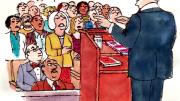During this year’s presidential campaign, the candidates will face many questions they do not want to answer. In most cases, they will do what politicians usually do: talk about something else.
Every politician dodges questions, but only sometimes are they able to do so without anybody noticing. Recent research by Todd Rogers, a behavioral scientist, social psychologist, and assistant professor of public policy at the Harvard Kennedy School, sheds light on the circumstances and techniques that allow politicians to wriggle away from difficult subject matter.
Rogers hoped to determine “under what conditions people are able to get away with dodging a question, and under what conditions listeners can be empowered to help detect when this kind of question-dodging occurs.”
He and his research partner, Michael I. Norton, an associate professor in the marketing unit of Harvard Business School, devised a series of simple experiments to determine when people detect a dodge and when they don’t. After prerecording a speaker answering a question about universal healthcare, they attached the same answer to three separate questions—the original one about healthcare, another about illegal drug use, and a final one about the war on terror. Then they showed the three tapes to separate groups of subjects and asked them to assess the truthfulness of the speaker.
Their results, published in the Journal of Experimental Psychology, showed that “artful dodging” depends on subtlety. When the speaker gave a response about healthcare to a question about illegal drug use—which sounds similar but is in fact quite unrelated—his audience found him just as trustworthy as did the group who heard him answer a question about universal healthcare. (In fact, when quizzed afterward, almost none of the subjects in the drug-use scenario could remember exactly what question had been asked.) Only when the speaker responded to a question about the war on terror with an answer on healthcare did the subjects notice the dodge.
Rogers believes there are two reasons for this inability to detect subtle evasions. The first, he says, is that humans simply have a limited attention span. Poor attention is universal to all “humans and all animals that we manage to study,” he says. “Though we don’t realize it, we go through our lives detecting just the gist of what’s going on. Even if we wanted to pay careful attention to each answer, we would have a limited capacity” to do so. A second, related reason is that paying attention to a speaker involves taking in an overwhelming amount of information. When watching a presidential debate, for example, viewers are considering not only the questions and answers but also the speakers’ body language, facial expressions, and overall likability. This adds yet another level of cognitive challenge, making it more difficult to remember whether a given answer is a specific response to the question asked.
Rogers does think there are ways to minimize “artful dodging” in political discourse. Television producers and documentary filmmakers, for example, can actively remind audiences of what was asked by displaying the text of questions right on the screen while the candidate answers. In one study, he reports, “We posted the text of the question on the screen, and everybody detected what was going on”—even in the case of subtle dodges. Another approach, employed during recent Fox/YouTube Republican debates, is to ask the audience to use social media to grade the candidates on their responses. “At the beginning of the debate, the moderator asked viewers to tweet whether the person answered the question they were asked,” Rogers says. “Asking the audience to hold the speakers accountable is a very cool idea.”
Yet Rogers is quick to point out that dodging isn’t necessarily a bad thing, at least on a personal level. For instance, avoiding direct answers to questions can be useful in precarious social situations when other people’s feelings are at stake. But in politics, Rogers thinks, dodging should be kept to a minimum. “I don’t think that dodging is lying,” he says, “but I think it’s a problem for democracy.”









